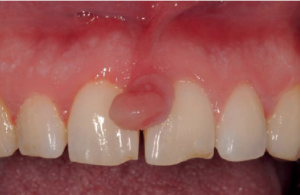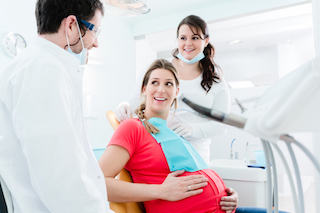SHARES

Having dental work done can be daunting especially when you are pregnant. However, preventive cleanings and check-ups during pregnancy are not only safe, but also recommended. Your mouth is a major gateway to different areas of your body. A well-maintained oral health ensures a good overall health thus a smooth pregnancy journey.
How will pregnancy affect your mouth?
Your pregnancy can affect your teeth and gums in several ways. First of all, your oral health can have an effect on the health of your developing baby. Research has shown that pregnancy can increase the amount of bacteria in your oral cavity. Moreover, hormonal changes during pregnancy can affect your gum health, causing them to become more sore, irritated and inflamed. Your gums may also bleed a little when brushing or flossing.
Furthermore, morning sickness can increase the amount of acid in your mouth thus increasing the risk of tooth decay. If you eat more carbohydrates than usual during pregnancy, this makes you more prone to cavities as well.
In some cases, “pregnancy tumours” may appear on gums and this most often happens during the second trimester. However, it is not cancer but instead a swelling which may bleed easily and has a red, raw-looking appearance. There is no need to worry as they usually disappear after the baby delivery.
Pregnancy epulis (“pregnancy tumours”). (Image source)
Is it safe to go to the dentist during pregnancy?
Dental Procedures
If you think you might be pregnant, inform your dentist during your appointment. Also, you can check with your obstetrician to see if there are any special precautions or instructions for you. Routine dental care can be carried out during pregnancy particularly urgent procedures. However, elective dental procedures should be postponed until after delivery. As a precautionary measure, you may want to avoid dental work during the first and third trimesters of your pregnancy. Dental procedures done during the second trimester has been shown to be safe for both the mother and child.
Dental Medications
It is important to let your dentist be aware of any prescription medications and over-the-counter drugs you are taking. Your dentist will then determine what type of prescription is suitable for you. Currently, there are still controversies surrounding the possible adverse effects on developing baby from the medications used during dental procedures. The amount of anaesthesia administered should be as minimal as possible but still adequate enough to make you comfortable. Nevertheless, a study from the American Dental Association identified no evidence to show that dental anaesthetics are harmful during pregnancy.
Dental X-rays
Advancement in technology has made X-rays much safer today compared to last time. Dental x-rays may be necessary if there is a problem or an emergency. Extreme caution and steps such as lead shielding around abdomen and thyroid area helps to safeguard you and your baby. According to the American College of Radiology, diagnostic x-ray does not have radiation dose significant enough to cause any adverse effects in a developing embryo or foetus.
What are some tips to maintain your dental health during pregnancy?
- Regular brushing and flossing with fluoride toothpaste. Using a soft-bristled toothbrush helps as your gums are more likely to bleed during pregnancy.
- Chew sugarless or xylitol-containing gums 2 to 3 times a day. This helps to decrease the amount of plaque on your teeth.
- If you suffer from morning sickness, try to wait an hour after vomiting before brushing your teeth. Brushing after vomiting can cause the protective layer of your teeth to wear away.
- Rinse your mouth with a teaspoon of baking soda mixed with a cup of water to balance the pH in your mouth.
- Adapt to nutritional diet such as raw fruits, vegetables, yoghurt and cheese. These foods are healthy for both you and your baby and contain less sugar that can damage your teeth.
6. Avoid sugary snacks especially sweet cravings during pregnancy. The higher the frequency of snacking ,the greater the chance of developing tooth decay.
Conclusion
Visiting a dentist might be the last thing to do on your mind if you have just found out that you are expecting. However, a dental visit should not fall off your pregnancy to-do list as a good oral health is part of your overall wellbeing.
If you need to consult a Dental Surgeon: call, send an enquiry or book an appointment on GetDoc.
Find a Dental Surgeon in Malaysia, on GetDoc
Find a Dental Surgeon in Singapore, on GetDoc
by Soh May Leng
Born and raised in Malaysia, May Leng obtained her Bachelor of Dental Surgery from the University of Otago, New Zealand. She has joined the GetDoc team to relay valuable health information to the public. Staying active plays a big part in her daily life especially through outdoor sports such as running and swimming. She also enjoys travelling and has a passion for photography. View all articles by Soh May Leng.








